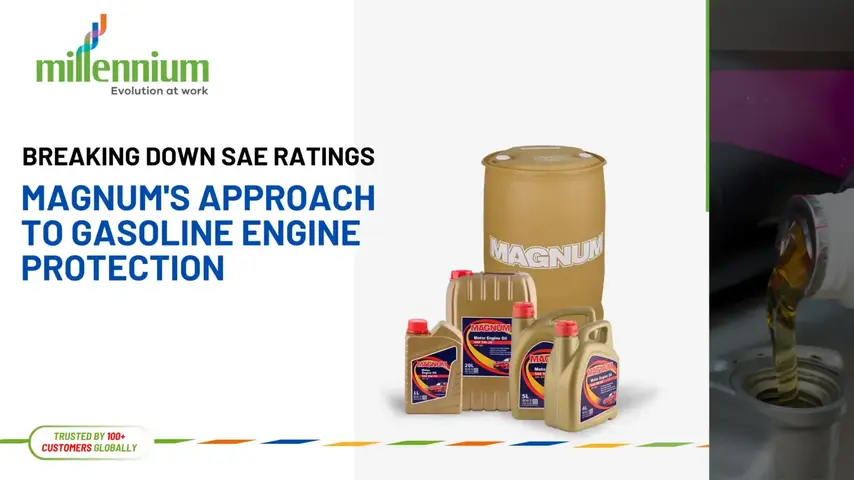Understanding Sae Oil Ratings
The Society of Automotive Engineers (SAE) has developed a standardized system of oil ratings that categorizes motor oils based on their viscosity characteristics and performance at various temperatures. Understanding these ratings is crucial for ensuring optimal protection and performance of gasoline engines. Viscosity, a measure of a fluid’s resistance to flow, plays a critical role in an engine’s lubrication process. SAE ratings, depicted by a numerical code (e.g., SAE 10W-30), indicate the oil’s viscosity and its capacity to perform in different temperature ranges.
Magnum adopts this understanding as a foundation for its oils, formulating products that align with specific SAE ratings to offer enhanced engine wear protection. By providing the optimum balance of viscosity and thermal stability, Magnum oils contribute not only to improved engine performance but also to extended durability, accommodating the demands of modern gasoline engines effectively.
Magnum’s Approach To Gasoline Engine Protection
Magnum’s approach to gasoline engine protection focuses on utilizing advanced lubricant formulations that align with SAE oil ratings to provide superior performance and long-lasting protection for engines. By understanding the significance of these ratings, Magnum ensures that their oils meet the specified viscosity requirements necessary for maintaining optimal engine efficiency and reliability under varying temperature conditions. SAE ratings are crucial in determining the thickness of the oil at specific temperatures, which directly affects the lubrication quality and engine performance.
Magnum oils are engineered to offer enhanced wear protection, ensuring that critical engine components are well-lubricated, reducing friction and minimizing wear and tear. This results in prolonged engine life and reduced maintenance costs, a benefit highly valued by car owners. Additionally, these oils are formulated to optimize engine performance, providing better fuel efficiency and smoother operation. This is achieved by reducing engine deposits and sludge, which can compromise engine power and cleanliness.
Durability and stability are also key attributes of Magnum oils, allowing them to perform consistently even in extreme conditions. By preventing oil degradation over time, Magnum ensures engines are protected throughout the entirety of oil change intervals. Whether driving in cold winters or scorching summers, Magnum’s dedication to understanding and applying SAE ratings in their products ensures reliable protection and performance for all gasoline engines.
Benefits Of Magnum Oils With Respect To Sae Ratings
Magnum oils are renowned for their ability to enhance engine protection, and their alignment with SAE ratings significantly contributes to this reputation. The Society of Automotive Engineers (SAE) has established a system that categorizes oils based on their viscosity characteristics at high and low temperatures. Understanding these ratings is pivotal for ensuring optimum engine performance, durability, and longevity.
Magnum oils, with their wide range of SAE-rated offerings, cater to various environmental conditions and engine requirements. They provide excellent viscosity stability, ensuring that the oil maintains its protective layer even under extreme temperatures, whether during cold starts or at high operating temperatures. This stability minimizes wear and tear on engine components by maintaining consistent lubrication, which is crucial for reducing friction and preventing metal-to-metal contact.
Moreover, Magnum oils UAE formulated in line with specific SAE ratings are designed to enhance fuel efficiency by reducing engine drag. This optimization is achieved through the precise calibration of oil thickness as per SAE guidelines, ensuring the engine operates at peak performance. Enhanced protection against sludge and deposit formation is also a hallmark of Magnum oils, which is crucial for maintaining an engine’s cleanliness and efficiency over time.
Enhanced Engine Wear Protection
Enhanced engine wear protection is a critical aspect of maintaining the longevity and performance of gasoline engines, and Magnum’s oils are meticulously formulated to address this need effectively. The Society of Automotive Engineers (SAE) ratings provide a standardized measure of oil viscosity, which is pivotal in ensuring that the oil effectively reduces friction and wear between engine components. Magnum’s approach involves a strategic blend of advanced additives and high-quality base oils, specifically designed to operate within the viscosity parameters outlined by SAE ratings.
By selecting oils that conform to these ratings, Magnum ensures that their products offer reliable performance across a wide range of temperatures and operating conditions. This adaptability is essential for minimizing wear during cold starts, extreme heat, and under heavy load conditions, where engine components are most susceptible to damage. Magnum’s oils are engineered to maintain a stable lubricating film under these challenging conditions, thereby reducing metal-to-metal contact and preventing premature wear.
Optimized Engine Performance: Durability & Stability
Optimized engine performance is a crucial goal for any vehicle owner, and selecting the right oil plays a critical role in achieving it. Magnum’s approach to gasoline engine protection emphasizes the importance of matching oil properties with SAE ratings to ensure both durability and stability over time. SAE ratings, developed by the Society of Automotive Engineers, categorize engine oils based on their viscosity characteristics.
Magnum oils are specifically formulated to meet these viscosity standards, ensuring they perform optimally under varying temperatures and conditions. By choosing an oil that is aligned with the appropriate SAE rating, drivers can ensure their engines operate smoothly, reducing friction and wear over time. Magnum oils are designed to maintain their viscosity even in extreme temperature variations, contributing to consistent engine performance.
Guidelines For Choosing The Right Magnum Oil Based On Sae Ratings
When selecting the appropriate Magnum oil based on SAE ratings, it is essential to understand the specific needs of your gasoline engine and the conditions under which it operates. SAE ratings primarily indicate the oil’s viscosity, which affects how well it can protect the engine across different temperature ranges. For areas with colder climates, choosing an oil with a lower cold temperature viscosity, such as 0W or 5W, ensures that the oil flows smoothly during cold starts, providing immediate lubrication and minimizing frictional wear.
Conversely, for regions with higher temperatures or when the engine runs hotter, an oil with a higher viscosity grade, such as 30, 40, or 50, may offer better protection against thinning and maintain adequate film strength at operating temperatures, thereby safeguarding engine components.
